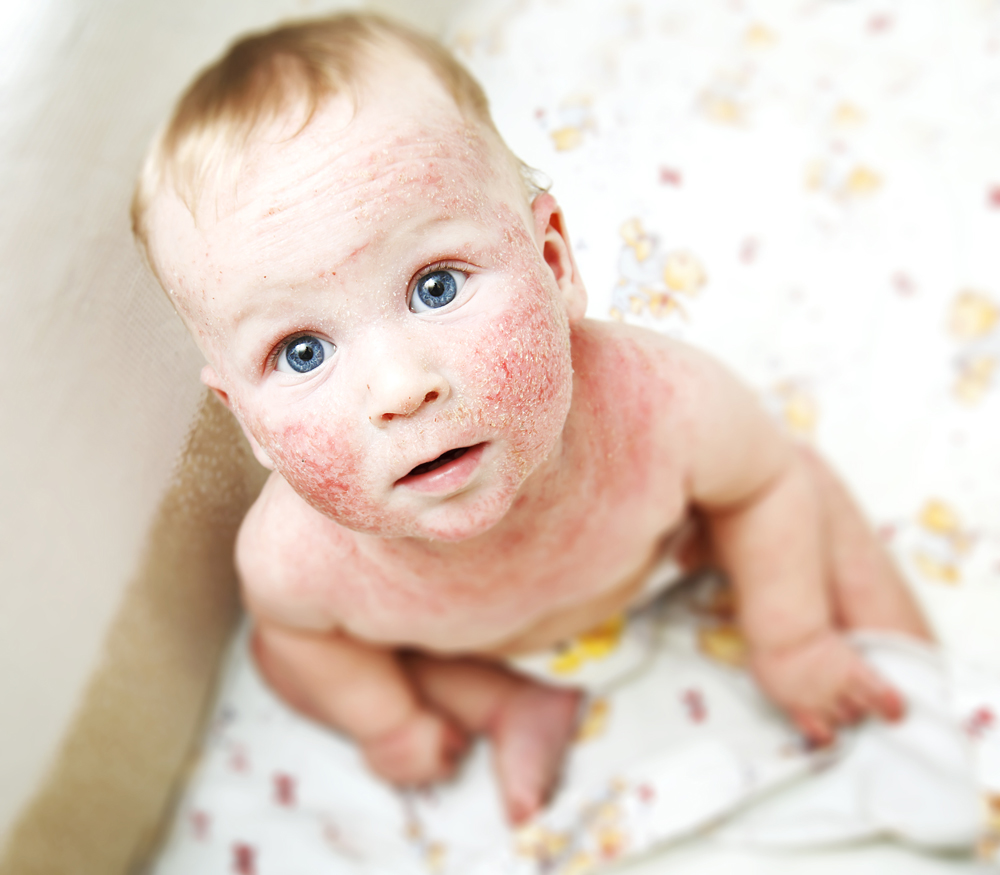21 Sep Eczema
 The word eczema comes from the Greek ekzein, meaning to boil and anyone who has suffered the red, irritated and inflamed skin condition will understand why the term originated; when the skin flares up, it really can feel like it’s bubbling and boiling over.
The word eczema comes from the Greek ekzein, meaning to boil and anyone who has suffered the red, irritated and inflamed skin condition will understand why the term originated; when the skin flares up, it really can feel like it’s bubbling and boiling over.
Eczema or atopic dermatitis is largely an inherited dry skin condition characterised by inflammation and itching. Sadly, there is still no cure for eczema, however many people grow out of the condition and while you’re waiting, there are very effective treatments to ease irritation and soothe the skin.
How common is eczema?
Eczema is a common skin complaint, especially in children, often starting in the first few months of life. In the UK as many as one in five children are affected, this falls to around one in twelve in adulthood.
The vast majority of people with eczema will notice flare-ups before they reach the age of 5. But the good news is that many children’s symptoms will become milder and disappear when they head into adolescence, with as many as 7 in 10 having a total remission. However, there are still a significant number of people that still suffer relapses in later life and for some people eczema can appear for the first time as an adult.
Is eczema hereditary?
The underlying causes of eczema are not fully understood but a vulnerability to developing eczema does definitely run in some families. It’s part of our genetic make-up and is called an ‘atopic tendency’. Put simply, if a parent is affected by eczema, asthma or hay fever, then any child they have is more likely to suffer from these conditions too. However, it’s important to remember that it is an inherited tendency not a destiny. Many children will not be affected, in fact if one parent has eczema a child has a 37.9% chance of developing the condition, this rises to 50% if both parents are affected. Our genes, together with environmental factors act in combination to define each individual’s risk.
Healthy skin acts as a barrier between our body and the outside world. It keeps infections, irritants and allergens out and stops too much moisture being lost. In people with eczema, the skin’s barrier function is impaired, there is increased water loss and irritant substances can enter their skin leading to dryness and inflammation.
What are the signs and symptoms of eczema?
The inflamed skin of eczema will appear red and dry, especially on the face, neck and wrists and in the bends of the elbows and knees. Scratch marks and bleeding are also common, because the rash can be ferociously itchy, often disturbing sleep and affecting concentration in the school or workplace.
When eczema flares up, blisters may develop and the skin may become moist, or weep fluid. Chronic, longstanding itching and inflammation can lead to the skin becoming thickened and rough, this is called lichenification and can lead to even more itchiness. It’s all part of the frustrating itch-scratch cycle, with itching causing scratching causing more itching, it’s vital to take control of the skin and break this vicious cycle.
What triggers an eczema flare up?
Eczema can be incredibly frustrating, one day your skin can be smooth and symptom-free and the next you may be unable to sleep because of the relentless itching. There are lots of things that can make eczema worse, so with a little detective work you can identify the culprits and reduce the danger of flare-ups:
- Irritant chemicals such as soap, cleaning products and colours, fragrances, SLS, halogens and parabens in skin preparations. It’s important to use soap-free cleansing products and always choose emollients and cosmetics that are free from sensitising substances
- Infection and illness
- Skin dryness
- Allergens from damp, mould or pets
- Stress
- Hormonal changes during the menstrual cycle in women
- Heat, central heating and sun exposure
- Too much bathing or swimming
- Rough, irritant or ill-fitting clothes can rub, causing friction and triggering a flare-up
- Occupational exposure, this can include chemical exposure to hair products for hairdressers or latex gloves for nurses, doctors and other health professionals

Keeping eczema under control
Eczema cannot be cured, but with a little care the itching and inflammation can be eased. The right treatment will depend on how bad the eczema is, with medications being stepped up during flare-ups.
- Emollients like AproDerm® are the mainstay of therapy for eczema, acting to both prevent and treat attacks. Emollients are topical treatments that form a protective layer over the skin surface, trapping in water and moisturising the skin cells. When applied liberally and frequently they can decrease itching and reduce the risk of flare-ups. Many skincare products contain chemicals that can cause skin sensitisation and or irritation so it is advisable to avoid such products where possible. The AproDerm® range has been scientifically formulated to be free from SLS, parabens, halogens, fragrances and colours to decrease the danger of inflammation. AproDerm® is able to penetrate through the upper layers, restoring the skin barrier and preventing the entry of irritants and infections. Regular use of emollients can help break the itch-scratch cycle.
- Colloidal oats: Oatmeal has traditionally been used for hundreds of years to relieve itch and irritation. Colloidal oat acts to both moisturise and restore the skin’s natural barrier as well as buffering and cleansing the skin. AproDerm® Colloidal Oat Cream is scientifically formulated with active colloidal oatmeal, which has been proven to protect and restore the skin’s surface.
- Topical steroids: If the skin is inflamed or thickened, your doctor or GP may prescribe steroid ointments or creams to help get the inflammation under control. These can be potent products, with significant side-effects, so should only be used under medical supervision.
- Treat infection: If the skin is weeping, there’s pus, increased inflammation or the rash is not responding to treatment then it’s important to see your GP or Dermatologist, as there may be an infection that needs antibiotic or antiviral therapy.
When you’re suffering sleepless nights, tearing at your skin with your fingernails, it can seem that there’s no relief – however by carefully monitoring your triggers and regularly applying emollients you will be able to control your eczema, instead of it controlling you.



Sorry, the comment form is closed at this time.